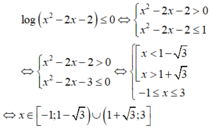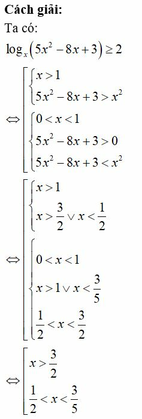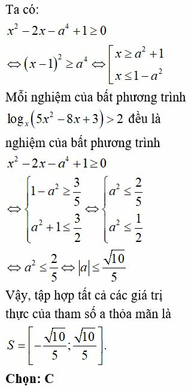Giải bất phương trình: - 2x + 2 - 3 0 trên tập số thực

Những câu hỏi liên quan
Giải bất phương trình và biểu diễn tập nghiệm trên trục số
|3x+2|<5x-4
(x-2) (2x+1)>0
x+2/x-3_>0
x2+1/x2-4<0
S là tập hợp tất cả các giá trị thực của tham số a thỏa mãn mỗi nghiệm của bất phương trình
log
x
(
5
x
2
-
8
x
+
3
)
2
đều là nghiệm của bất phương trình
x
2
-
2
x
-
a
4
+
1
≥
0
.
Khi đó:...
Đọc tiếp
S là tập hợp tất cả các giá trị thực của tham số a thỏa mãn mỗi nghiệm của bất phương trình log x ( 5 x 2 - 8 x + 3 ) > 2 đều là nghiệm của bất phương trình x 2 - 2 x - a 4 + 1 ≥ 0 . Khi đó:
A. S = - 10 5 ; 10 5 .
B. S = - ∞ ; - 10 5 ∪ 10 5 ; + ∞
C. S = - 10 5 ; 10 5 .
D. S = - ∞ ; - 10 5 ∪ 10 5 ; + ∞ .
Giải bất phương trình
l
o
g
(
x
2
-
2
x
-
2
)
≤
0
A. [-1; 3] B.
(
1
-
3
;
1
+
3
)
C.
[
-
1
;
1
-
3
)
∪...
Đọc tiếp
Giải bất phương trình l o g ( x 2 - 2 x - 2 ) ≤ 0
A. [-1; 3]
B. ( 1 - 3 ; 1 + 3 )
C. [ - 1 ; 1 - 3 ) ∪ ( 1 + 3 ; 3 ]
D. (-∞; -1) ∪ (3; +∞)
Chọn C

⇒ [ - 1 ; 1 - 3 ) ∪ ( 1 + 3 ; 3 ]
Đúng 0
Bình luận (0)
Giải bất phương trình
l
o
g
(
x
2
-
2
x
-
2
)
≤
0
A. [-1; 3] B.
(
1
-
3
;
1
+
3
)
C.
[
-
1
;
...
Đọc tiếp
Giải bất phương trình l o g ( x 2 - 2 x - 2 ) ≤ 0
A. [-1; 3]
B. ( 1 - 3 ; 1 + 3 )
C. [ - 1 ; 1 - 3 ) ∪ ( 1 + 3 ; 3 ]
D. (-∞; -1) ∪ (3; +∞)
Bài 1: Giải các bất phương trình sau
a) x+1/x+3 > 1
b) 2x-1/x-3 ≤ 2
c) x2+2x+2/x2+3 ≥ 1
d) 2x+1/x2+2 ≥ 1
a, \(\dfrac{x+1}{x+3}>1\Leftrightarrow\dfrac{x+1}{x+3}-1>0\Leftrightarrow\dfrac{x+1-x-3}{x+3}>0\)
\(\Rightarrow x+3< 0\)do -2 < 0
\(\Rightarrow x< -3\)Vậy tập nghiệm BFT là S = { x | x < -3 }
b, \(\dfrac{2x-1}{x-3}\le2\Leftrightarrow\dfrac{2x-1}{x-3}-2\le0\Leftrightarrow\dfrac{2x-1-2x+6}{x-3}\le0\)
\(\Rightarrow x-3\le0\)do 5 > 0
\(\Rightarrow x\le3\)Vậy tập nghiệm BFT là S = { x | x \(\le\)3 }
c, \(\dfrac{x^2+2x+2}{x^2+3}\ge1\Leftrightarrow\dfrac{x^2+2x+2}{x^2+3}-1\ge0\)
\(\Leftrightarrow\dfrac{x^2+2x+2-x^2-3}{x^2+3}\ge0\Rightarrow2x-1\ge0\)do x^2 + 3 > 0
\(\Rightarrow x\ge\dfrac{1}{2}\)Vậy tập nghiệm BFT là S = { x | x \(\ge\)1/2 }
Đúng 2
Bình luận (0)
mình ko chắc nên mình đăng sau :>
d, \(\dfrac{2x+1}{x^2+2}\ge1\Leftrightarrow\dfrac{2x+1}{x^2+2}-1\ge0\Leftrightarrow\dfrac{2x+1-x^2-2}{x^2+2}\ge0\)
\(\Rightarrow-x^2+2x-1\ge0\Rightarrow-\left(x-1\right)^2\ge0\)vô lí
Đúng 1
Bình luận (1)
Giải bất phương trình
x2-2x+1<9
(x-1)(4-x2)≥0
\(\dfrac{x+2}{x-5}\)<0
\(x^2-2x+1< 9\)
\(\Leftrightarrow\left(x-1\right)^2< 9\)
\(\Leftrightarrow x-1< 3\)
\(\Leftrightarrow x< 4\)
\(\left(x-1\right)\left(4-x^2\right)\ge0\)
\(\Leftrightarrow\left(x-1\right)\left(2-x\right)\left(2+x\right)\ge0\)
\(\Leftrightarrow\left[{}\begin{matrix}x-1=0\\2-x=0\\2+x=0\end{matrix}\right.\)
\(\Leftrightarrow\left[{}\begin{matrix}x=1\\x=2\\x=-2\end{matrix}\right.\)
\(\dfrac{x+2}{x-5}< 0\)
\(\Leftrightarrow x+2< 0\)
\(\Leftrightarrow x< -2\)
Đúng 0
Bình luận (0)
a)\(x^2-2x+1< 9\)
\(\Leftrightarrow\left(x-1\right)^2< 9\)
\(\Leftrightarrow\left(x-1\right)^2-9< 0\)
\(\Leftrightarrow\left(x-1-3\right)\left(x-1+3\right)< 0\)
\(\Leftrightarrow\left(x-4\right)\left(x+2\right)< 0\)
\(\Leftrightarrow\left[{}\begin{matrix}x-4< 0\\x+2>0\end{matrix}\right.hay\left[{}\begin{matrix}x-4>0\\x+2< 0\end{matrix}\right.\)
\(\Leftrightarrow\left[{}\begin{matrix}x< 4\\x>-2\end{matrix}\right.hay\left[{}\begin{matrix}x>4\\x< -2\end{matrix}\right.\)(vô lý)
-Vậy nghiệm của BĐT là \(-2< x< 4\).
b) \(\left(x-1\right)\left(4-x^2\right)\ge0\)
\(\Leftrightarrow\left(x-1\right)\left(2-x\right)\left(x+2\right)\ge0\)
\(\Leftrightarrow\left(x-1\right)\left(x-2\right)\left(x+2\right)\le0\)
\(\Leftrightarrow\left[{}\begin{matrix}x-1< 0\\x-2>0\\x+2>0\end{matrix}\right.\) hay \(\left[{}\begin{matrix}x-1>0\\x-2< 0\\x+2>0\end{matrix}\right.\) hay \(\left[{}\begin{matrix}x-1>0\\x-2 >0\\x+2< 0\end{matrix}\right.\) hay \(\left[{}\begin{matrix}x-1< 0\\x-2< 0\\x+2< 0\end{matrix}\right.\)
\(\Leftrightarrow\left[{}\begin{matrix}x< 1\\x>2\\x>-2\end{matrix}\right.\) (vô lí) hay \(\left[{}\begin{matrix}x>1\\x< 2\\x>-2\end{matrix}\right.\) (có thể xảy ra) hay
\(\left[{}\begin{matrix}x>1\\x>2\\x< -2\end{matrix}\right.\) (vô lí) hay \(\left[{}\begin{matrix}x< 1\\x< 2\\x< -2\end{matrix}\right.\) (có thể xảy ra)
-Vậy nghiệm của BĐT là \(x< -2\) hay \(1< x< 2\).
c) ĐKXĐ: \(x\ne5\)
\(\dfrac{x+2}{x-5}< 0\Leftrightarrow\left[{}\begin{matrix}x+2< 0\\x-5>0\end{matrix}\right.hay\left[{}\begin{matrix}x+2>0\\x-5< 0\end{matrix}\right.\Leftrightarrow\left[{}\begin{matrix}x< -2\\x>5\end{matrix}\right.\)(vô lí) hay
\(\left[{}\begin{matrix}x>-2\\x< 5\end{matrix}\right.\) (có thể xảy ra)
-Vậy nghiệm của BĐT là \(-2< x< 5\)
Đúng 0
Bình luận (1)
Giải phương trình:
(x2-1)3+(x2+2)3+(2x-1)3+(3x+3)(2x-1)(1-x)(x2+2)=0
Lời giải:
PT $\Leftrightarrow (x^2-1)^3+(x^2+2)^3+(2x-1)^3-3(x^2-1)(x^2+2)(2x-1)=0$
Đặt $x^2-1=a; x^2+2=b; 2x-1=c$ thì pt trở thành:
$a^3+b^3+c^3-3abc=0$
$\Leftrightarrow (a+b)^3+c^3-3ab(a+b)-3abc=0$
$\Leftrightarrow (a+b+c)[(a+b)^2-c(a+b)+c^2]-3ab(a+b+c)=0$
$\Leftrightarrow (a+b+c)(a^2+b^2+c^2-ab-bc-ac)=0$
$\Rightarrow a+b+c=0$ hoặc $a^2+b^2+c^2-ab-bc-ac=0$
Nếu $a+b+c=0$
$\Leftrightarrow x^2-1+x^2+2+2x-1=0$
$\Leftrightarrow 2x^2+2x=0$
$\Rightarrow x=0$ hoặc $x=-1$
Nếu $a^2+b^2+c^2-ab-bc-ac=0$
$\Leftrightarrow (a-b)^2+(b-c)^2+(c-a)^2=0$
$\Rightarrow a-b=b-c=c-a=0$ (dễ CM)
$\Leftrightarrow a=b=c$
$\Leftrightarrow x^2-1=x^2+2=2x-1$ (vô lý)
Vậy..........
Đúng 1
Bình luận (2)
giải các bất phương trình sau và biểu diễn tập nghiệp trên trục số
1, 6+2x ≥ 3-x
2, 2x+7 > 16-x
3, x-5<3x+1
1.
\(6+2x\ge3-x\)
\(\Leftrightarrow3x\ge-3\)
\(\Leftrightarrow x\ge-1\)
2.
\(2x+7>16-x\)
\(\Leftrightarrow3x>23\)
\(\Leftrightarrow x>\dfrac{23}{3}\)
3.
\(x-5< 3x+1\)
\(\Leftrightarrow2x>-6\)
\(\Leftrightarrow x>-3\)
Đúng 1
Bình luận (2)
Mik chưa học đến lớp 8 nên ko bt biểu diễn trên trục số nên chỉ tìm dc x thôi nha:
1. 6 + 2x \(\ge\) 3 - x
<=> 6 - 3 \(\ge\) -x - 2x
<=> 3 \(\ge\) -3x
<=> 3 : (-3) \(\ge\) -3x : (-3)
<=> -1 \(\le\) x
<=> x \(\ge\) -1
2. 2x + 7 > 16 - x
<=> 2x + x > 16 - 7
<=> 3x > 9
<=> 3x : 3 > 9 : 3
<=> x > 3
3. x - 5 < 3x + 1
<=> -5 - 1 < 3x - x
<=> -6 < 2x
<=> -6 : 2 < 2x : 2
<=> -3 < x
<=> x > (-3)
Đúng 0
Bình luận (0)
1: Ta có: \(2x+6\ge3-x\)
\(\Leftrightarrow3x\ge-3\)
hay \(x\ge-1\)
2: ta có: \(2x+7>16-x\)
\(\Leftrightarrow3x>9\)
hay x>3
3: Ta có: \(x-5< 3x+1\)
\(\Leftrightarrow-2x< 6\)
hay x>-3
Đúng 0
Bình luận (0)
Giải các phương trình sau trên tập số phức: 3 x 2 + 2x + 7 = 0






















